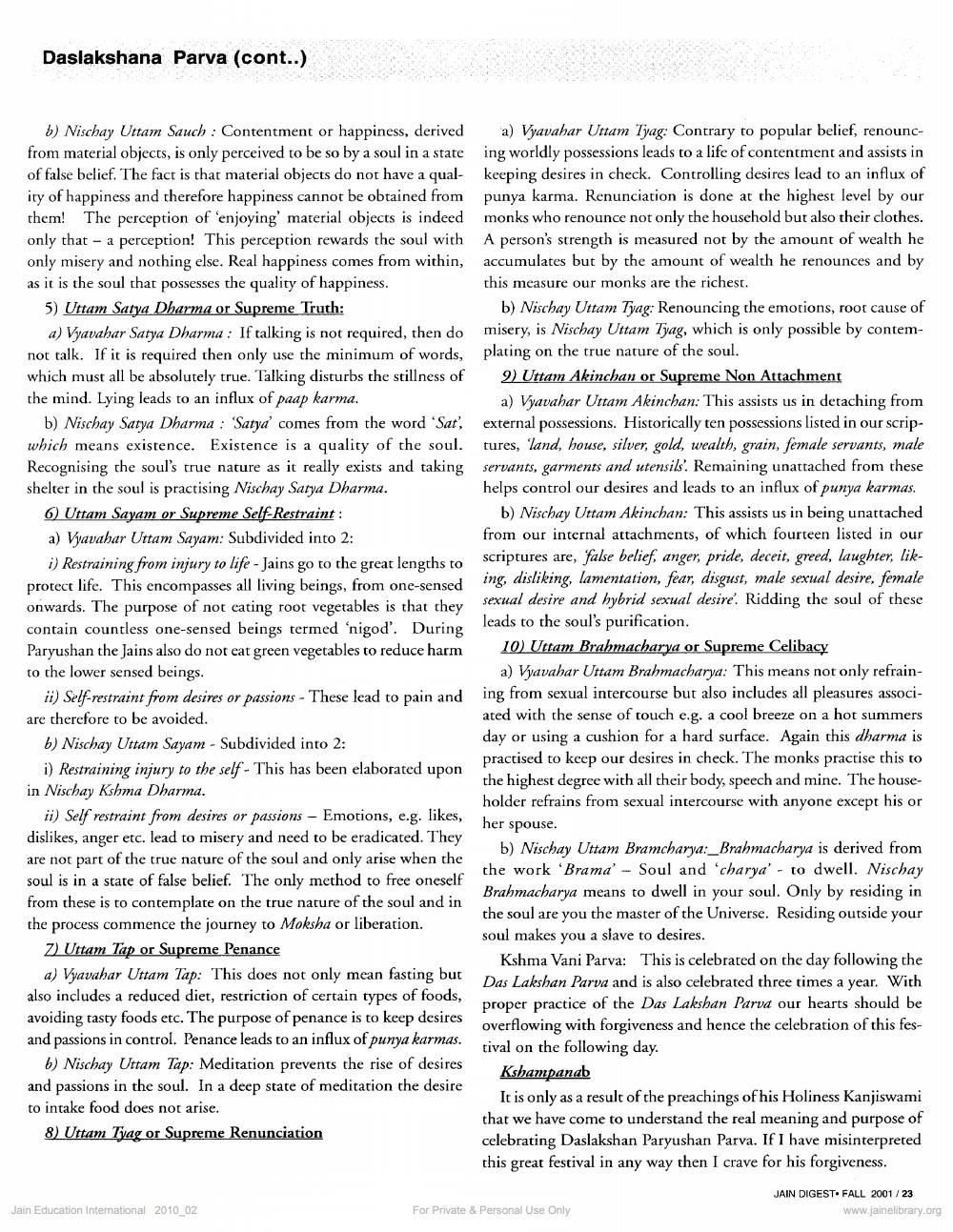________________
Daslakshana Parva (cont..)
b) Nischay Uttam Sauch: Contentment or happiness, derived from material objects, is only perceived to be so by a soul in a state of false belief. The fact is that material objects do not have a quality of happiness and therefore happiness cannot be obtained from them! The perception of 'enjoying' material objects is indeed only that - a perception! This perception rewards the soul with only misery and nothing else. Real happiness comes from within, as it is the soul that possesses the quality of happiness.
5) Uttam Satya Dharma or Supreme Truth:
a) Vyavahar Satya Dharma: If talking is not required, then do not talk. If it is required then only use the minimum of words, which must all be absolutely true. Talking disturbs the stillness of the mind. Lying leads to an influx of paap karma.
b) Nischay Satya Dharma: 'Satya' comes from the word 'Sat', which means existence. Existence is a quality of the soul. Recognising the soul's true nature as it really exists and taking shelter in the soul is practising Nischay Satya Dharma.
6) Uttam Sayam or Supreme Self-Restraint:
a) Vyavahar Uttam Sayam: Subdivided into 2:
i) Restraining from injury to life - Jains go to the great lengths to protect life. This encompasses all living beings, from one-sensed onwards. The purpose of not cating root vegetables is that they contain countless one-sensed beings termed 'nigod'. During Paryushan the Jains also do not eat green vegetables to reduce harm to the lower sensed beings.
b) Nischay Uttam Sayam - Subdivided into 2:
i) Restraining injury to the self- This has been elaborated upon in Nischay Kshma Dharma.
ii) Self restraint from desires or passions - Emotions, e.g. likes, dislikes, anger etc. lead to misery and need to be eradicated. They are not part of the true nature of the soul and only arise when the soul is in a state of false belief. The only method to free oneself from these is to contemplate on the true nature of the soul and in the process commence the journey to Moksha or liberation.
7) Uttam Tap or Supreme Penance
a) Vyavahar Uttam Tap: This does not only mean fasting but also includes a reduced diet, restriction of certain types of foods, avoiding tasty foods etc. The purpose of penance is to keep desires and passions in control. Penance leads to an influx of punya karmas. b) Nischay Uttam Tap: Meditation prevents the rise of desires and passions in the soul. In a deep state of meditation the desire to intake food does not arise.
8) Uttam Tyag or Supreme Renunciation
a) Vyavahar Uttam Tyag: Contrary to popular belief, renouncing worldly possessions leads to a life of contentment and assists in keeping desires in check. Controlling desires lead to an influx of punya karma. Renunciation is done at the highest level by our monks who renounce not only the household but also their clothes. A person's strength is measured not by the amount of wealth he accumulates but by the amount of wealth he renounces and by this measure our monks are the richest.
a) Vyavahar Uttam Brahmacharya: This means not only refrainii) Self-restraint from desires or passions - These lead to pain and ing from sexual intercourse but also includes all pleasures associare therefore to be avoided.
ated with the sense of touch e.g. a cool breeze on a hot summers day or using a cushion for a hard surface. Again this dharma is practised to keep our desires in check. The monks practise this to
the highest degree with all their body, speech and mine. The house
holder refrains from sexual intercourse with anyone except his or her spouse.
the work 'Brama' - Soul and 'charya' - to dwell. Nischay b) Nischay Uttam Bramcharya:_Brahmacharya is derived from Brahmacharya means to dwell in your soul. Only by residing in the soul are you the master of the Universe. Residing outside your
soul makes you a slave to desires.
Jain Education International 2010_02
b) Nischay Uttam Tyag: Renouncing the emotions, root cause of misery, is Nischay Uttam Tyag, which is only possible by contemplating on the true nature of the soul.
2) Uttam Akinchan or Supreme Non Attachment
a) Vyavahar Uttam Akinchan: This assists us in detaching from external possessions. Historically ten possessions listed in our scriptures, land, house, silver, gold, wealth, grain, female servants, male servants, garments and utensils. Remaining unattached from these helps control our desires and leads to an influx of punya karmas.
b) Nischay Uttam Akinchan: This assists us in being unattached from our internal attachments, of which fourteen listed in our scriptures are, false belief, anger, pride, deceit, greed, laughter, liking, disliking, lamentation, fear, disgust, male sexual desire, female sexual desire and hybrid sexual desire. Ridding the soul of these leads to the soul's purification.
10) Uttam Brahmacharya or Supreme Celibacy
Kshma Vani Parva: This is celebrated on the day following the Das Lakshan Parva and is also celebrated three times a year. With proper practice of the Das Lakshan Parva our hearts should be overflowing with forgiveness and hence the celebration of this festival on the following day.
Kshampanab
It is only as a result of the preachings of his Holiness Kanjiswami that we have come to understand the real meaning and purpose of celebrating Daslakshan Paryushan Parva. If I have misinterpreted this great festival in any way then I crave for his forgiveness.
For Private & Personal Use Only
JAIN DIGEST⚫ FALL 2001/23 www.jainelibrary.org




